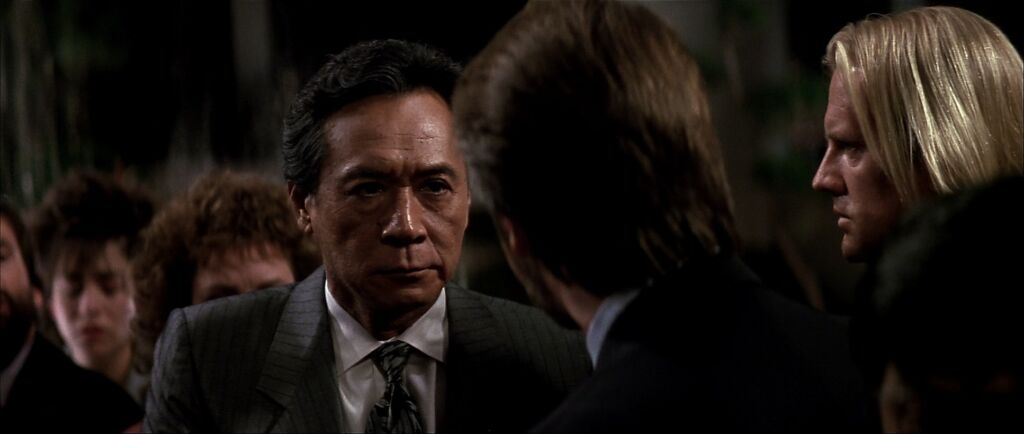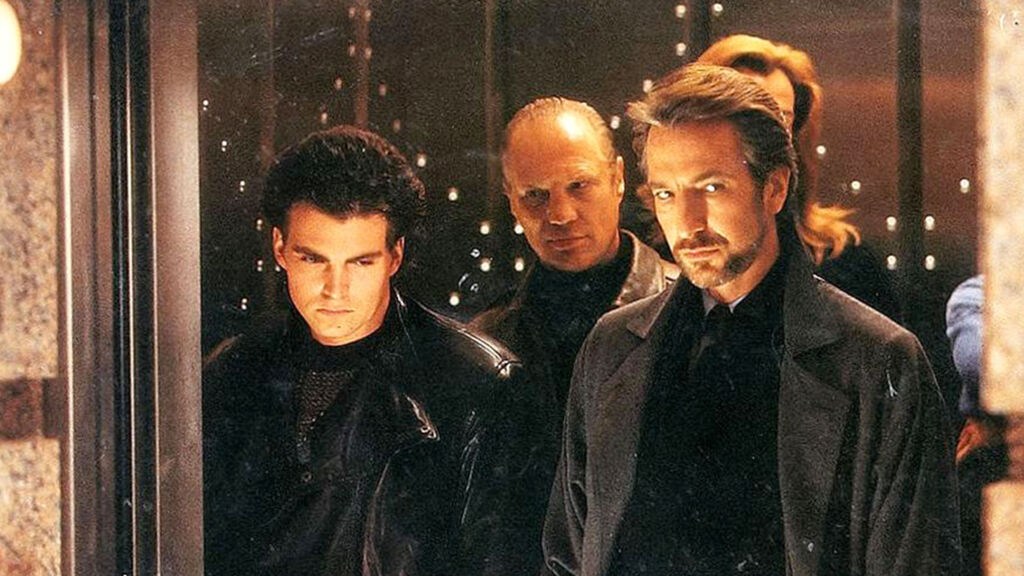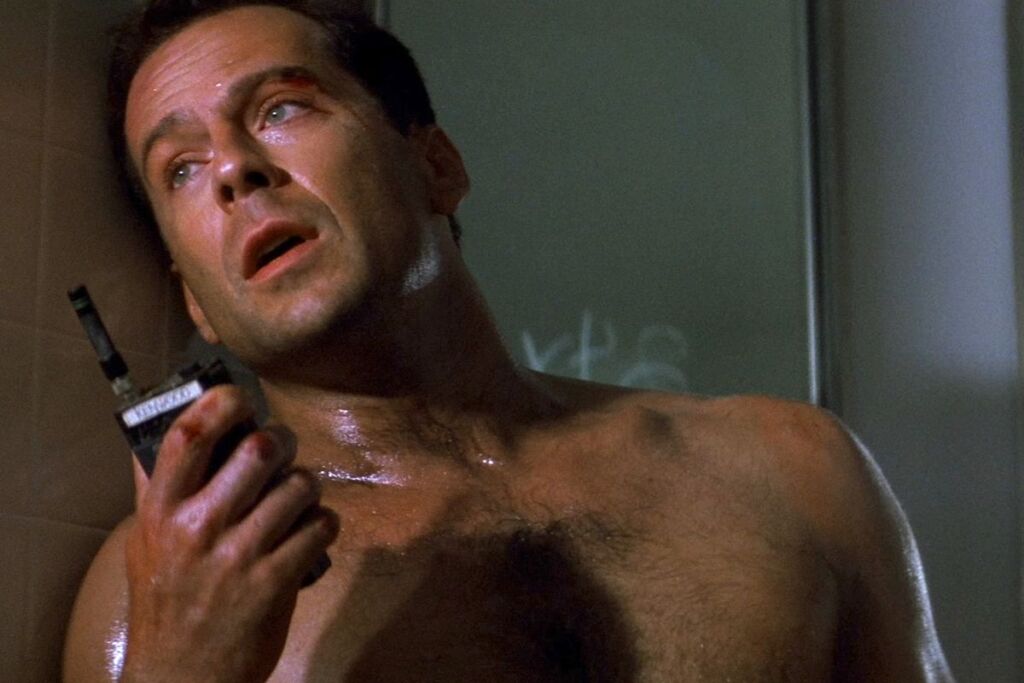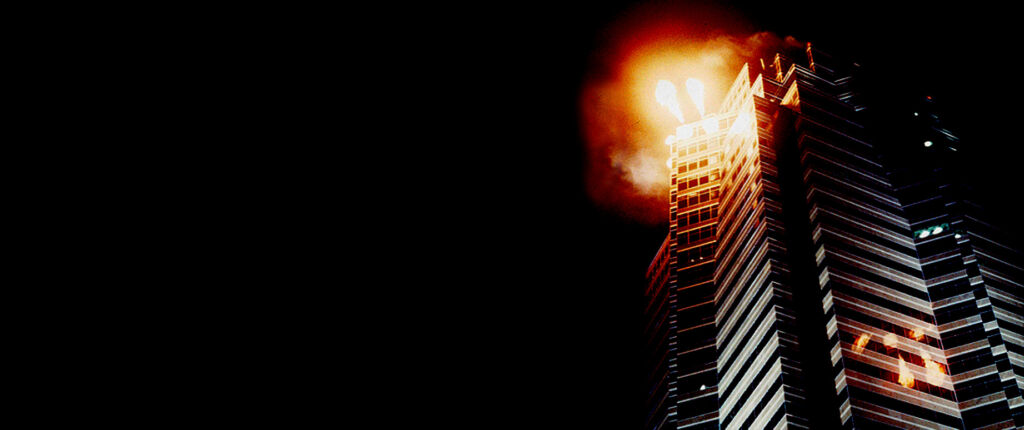The true meaning of Die Hard
It’s that time of year again when people debate whether or not Die Hard is a Christmas movie. It is, obviously, but as you settle down this festive season to watch New York cop John McClane battle terrorists on the upper floors of a Los Angeles skyscraper on Christmas Eve, consider what else lies beneath the surface of this ’80s action classic.
The setting

McClane is in Los Angeles to visit his wife, Holly, who moved out there with their kids to work for the Nakatomi Corporation. It’s never explained what the Nakatomi Corporation actually does, but it is the kind of Japanese corporation that scared many Americans in the 1980s.
Japanese auto companies, for example, were destroying their American competitors. They could produce better cars cheaper, and between 1975 and 1982, Japanese manufacturers’ share of total US new car sales rose from 9.4 percent to 22.6 percent. This opened up a massive trade deficit between the United States and Japan, with Americans buying much more from the Japanese than the Japanese were buying from them. The Japanese used the dollars they accumulated to buy assets like the Mobil Building in New York in 1987, Firestone Tire and Rubber Company in 1988, and the Rockefeller Center in Midtown Manhattan in 1989. “Pearl Harbor didn’t work so we got you with tape decks” jokes Holly’s boss, the doomed Mr. Takagi.
Some mainstream commentators took such military metaphors literally. Of 1991’s The Coming War With Japan — an actual war, not a trade war — Publisher’s Weekly wrote that while the authors “sometimes overstate their thesis…their scenario is plausible.” This tension was explored in a number of movies of the time, either comically, as in Gung Ho, dramatically, as in Black Rain, or exploitatively, as in Kinjite: Forbidden Subjects.
The villains

Die Hard makes some bold narrative moves, and one of the boldest is to make the villain, Hans Gruber, its protagonist. “If [Gruber] had not planned the robbery and put it together, [McClane] would have just gone to the party and reconciled or not with his wife,” screenwriter Steven E. de Souza explained, “You should sometimes think about looking at your movie through the point of view of the villain who is really driving the narrative.”
Gruber is revealed to be a former member of the fictional “radical West German Volksfrei movement,” which roughly translates as ‘People’s Freedom.’ It would seem, then, that he was once some sort of leftist, like Andreas Baader. But, like many former ’60s radicals, by 1988, Gruber’s goal is not revolution, but money, specifically “the 640 million dollars in negotiable bearer bonds that you have locked in your vault.”
Takagi: You want money? What kind of terrorists are you?
Gruber: (Laughs) Who said we were terrorists?
Indeed, Gruber exploits his old political motivations to hide his real motive. In one scene he tells the F.B.I.:
Gruber: I have comrades in arms around the world languishing in prison. The American State Department enjoys rattling its sabre for its own ends, now it can rattle it for me. The following people are to be released from their captors. In Northern Ireland, seven members of the New Provo Front. In Canada, the five imprisoned leaders of Liberté de Quebec. In Sri Lanka, the nine members of the Asian Dawn.
Karl: (Whispers) Asian Dawn?
Gruber: I read about them in Time magazine.
Gruber’s gang are cosmopolitan:
McClane: These guys are mostly European, judging by their clothing labels and cigarettes. They’re well-financed and very slick.
But Gruber’s gang aren’t McClane’s only obstacles. Die Hard paints an unflattering portrait of the media in the shape of Richard Thornburg, a local TV reporter, who puts Holly in jeopardy in his quest for a news story (Thornburg is played by William Atherton, who appeared as a similar weasel in Ghostbusters.)
‘Experts’ get a bad rap too. In one scene, a Dr. Hasseldorf, “author of ‘Hostage/Terrorist, Terrorist/Hostage, a Study in Duality,’” is heard on TV pontificating that:
…the hostages should be going through the early stages of the Helsinki Syndrome…Basically, it’s when the hostages and the terrorists go through a psychological transference and a projection of dependency. A strange sort of trust and bond develops. We’ve had situations where the hostages have embraced their captors after release and even corresponded with them in prison.
As he says that, a hostage’s corpse is being dragged away (it is also the Stockholm Syndrome, raising the question of whether Hasseldorf is all that expert after all. His interviewers fail to pick him up on it). The same is seen among law enforcement. The Deputy Police Chief, Dwayne T. Robertson, and two FBI agents named Johnson who take over from him are portrayed as pretty incompetent, the only useful one being McClane’s ally, Sgt. Al Powell:
Robertson: Powell, has it occurred to you that he could be one of the terrorists or some nutcase in there?
Powell: I don’t think so. In fact, I think he’s a cop. Maybe not LAPD, but he’s definitely a badge.
Robertson: How do you know that?
Powell: A hunch, things he said. Like being able to spot a phony ID.
One of Die Hard‘s themes is that it is the regular guys, the practitioners lower down the command chain, who are more likely to figure things out than those above them.
The hero

Which brings us to the hero, John McClane.
McClane is a man ill at ease with the late 1980s. His wife has left him and crossed the country to take a job where, to keep up with new, foreign customs, she uses her maiden name:
McClane: Since when did you start using Ms. Gennero?
Holly: This is a Japanese company. They figure a married woman’s…
McClane: You are a married woman, you’re married to me.
Displays of liberal, Californian mores — a guy planting a kiss on his cheek — see McClane sighing “California” like some latter day Archie Bunker. From Die Hard 2:
Holly: Honey, it’s the ’90s, remember? Microchips, microwaves, faxes…air phones.
McClane: Hey, well, as far as I’m concerned, progress peaked with frozen pizza.
Indeed, Die Hard makes McClane’s old-fashionedness — and Americanness — central themes. At one point, Gruber taunts him:
Gruber: …who are you? Just another American who saw too many movies as a child? Another orphan of a bankrupt culture who thinks he’s John Wayne? Rambo? Marshal Dillon?
McClane responds by invoking a TV cowboy from the 1950s: “I was always kind of partial to Roy Rogers actually.” Until they learn his real name, both Gruber and Powell, call him “cowboy.” McClane’s catchphrase, albeit it with added modern day vulgarity, seems to come from a Bing Crosby track from the 1930s. Indeed, in an earlier draft of the script, McClane tells Gruber at the film’s climax: “You were right about us Americans. We are cowboys.”
Die Hard explicitly places John McClane in that tradition of American Western movie and TV heroes, where “A man’s gotta do what a man’s gotta do.” Notice how, when Gruber’s gang seize control of the building, there is no scene of McClane deciding what to do — whether to go along with them or to resist. It isn’t even a choice for him, which is why the movie doesn’t linger over it. McClane’s instantaneous reaction to this threat is to grab his gun and head into the bowels of the building to do battle with this enemy and save his wife. McClane is the quintessential ‘Good guy with a gun.’
Ellis: …What does he think he’s doing?
Holly: His job.
Ellis: Bullshit. His job’s 3,000 miles away. Without him, we still have a chance to get out of here.
Holly: Tell that to Takagi.
A man’s gotta do what a man’s gotta do…
In many ways, McClane’s opposite in the film is not Gruber, but Ellis, Holly’s cackling, coke sniffing colleague who tries to negotiate with the bad guys: “You use a gun, I use a fountain pen. What’s the difference?” Ellis learns the hard way that there is a very profound difference. Again, the the sophisticated (in his own eyes at least) Ellis is no more successful than Dr. Hasseldorf, Deputy Chief Robertson, or the Johnsons at correctly identifying the nature of the threat posed by Gruber and his comrades and how to combat it. It is John McClane — “a dumb Irish flatfoot” as Gruber’s vengeful brother calls him in the third film — who does that. Die Hard celebrates the common sense wisdom of the Blue Collar American everyman.
“Welcome to the party”

So what do we have?
We have a ruthless, well-financed, cosmopolitan bunch of crooks lead by a former commie trying to knock off a mysterious Japanese corporation staffed by drug-addled nincompoops. They are foiled by one man, with a gun, acting alone: a regular American guy, who sees the world more clearly than his ‘superiors’; a man whose first instinct is to fight to protect his wife. McClane’s final victory, rescuing the Nakatomi hostages from the cosmopolitan villains, shows that America’s ‘cowboy’ culture isn’t so bankrupt after all.
Die Hard is loud, violent, and profane — it’s also exciting and funny — but it is as much a tribute to traditional ‘American’ virtues as any of the classic movies of John Wayne, Henry Fonda, or Jimmy Stewart. It belongs in a category with Miracle on 34th Street and It’s a Wonderful Life as one of the great Christmas movies, but it also belongs in a category with Ghostbusters and Back to the Future as a classic of conservative, 1980s Hollywood.